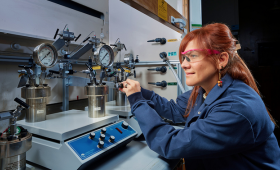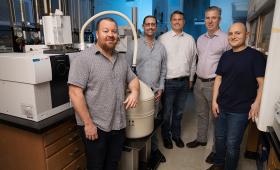A multi-institutional team involving LLNL researchers successfully combines an artificial intelligence (AI)-backed platform with supercomputing to redesign and restore antibody effectiveness.
Science and Technology Highlights
Researchers at LLNL accelerate and add features to complex multi-physics simulations run on Graphics Processing Units (GPUs), a development that could advance high performance computing and engineering.
To support the early detection of potentially detrimental microbial factors, LLNL researchers have developed a targeted panel for the capture and sequencing of microbial genomic signatures.
Using a bioengineered protein-based technology, LLNL scientists and collaborators develop a new separation technique for rare-earth elements (REE).
LLNL scientists and collaborators quantify and model the emergent temperature sensitivity of soil organic carbon.
LLNL researchers and partners develop a new storage method for excess renewable electricity from wind and solar sources.
LLNL scientists publish a paper on the the mysterious world of pitting corrosion in additively manufactured (3D-printed) stainless steel 316L in seawater.
A team of LLNL scientists conducts multi-million atomic molecular-dynamics simulations to uncover required temperature and pressure conditions for super-diamond creation.

LLNL has received $1 million to explore technologies that stimulate hydrogen production from mineral deposits found in the subsurface.

A Lawrence Livermore National Laboratory team has uncovered a new thermal decomposition pathway for an important explosive compound.

